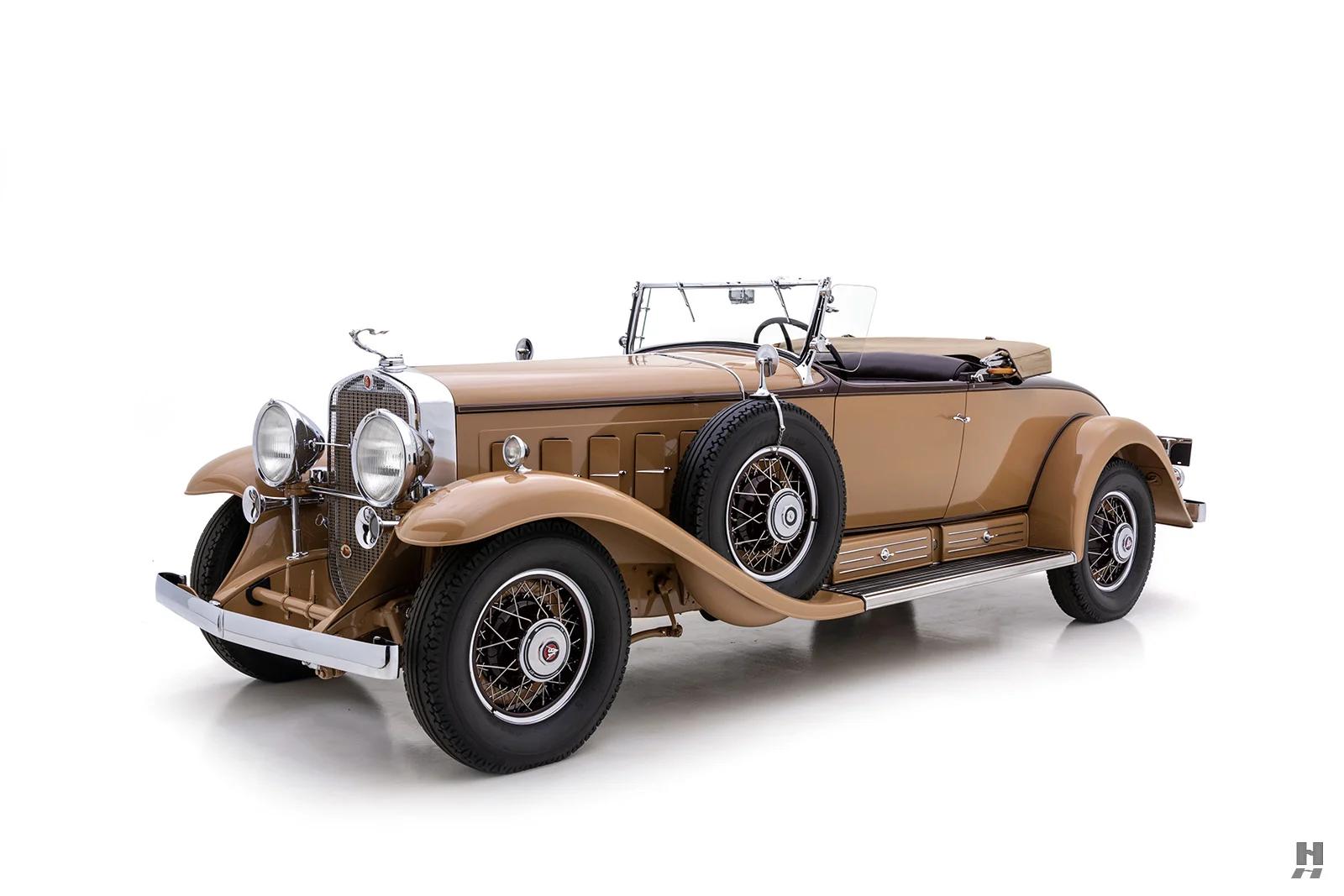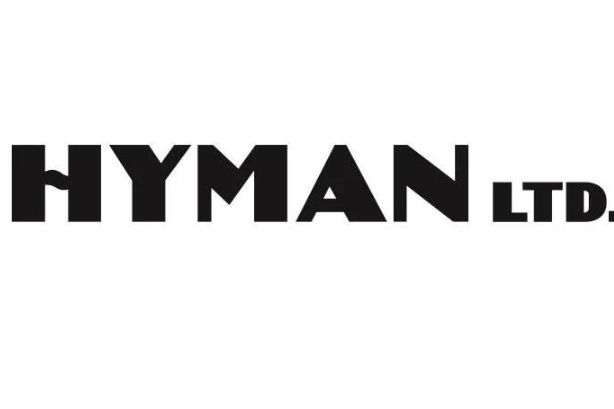1930 CADILLAC V16 ROADSTER
In New York on January 4, 1930, Cadillac stunned the motoring world as it introduced the breathtaking new V-16. While Bugatti had already produced a 16-cylinder engine by pairing two inline eight-cylinder units, Cadillac’s was the first true 16-cylinder automobile engine designed and purpose-built from scratch. Working under legendary GM engineering chief Charles Kettering, Owen Milton Nacker led V-16 development beginning in 1926, with strict secrecy including cover stories worthy of a covert operation and notations on various blueprints claiming the V-16 was simply Cadillac’s contribution to a new GM bus design.
Featuring modern overhead-valve cylinder heads, a 45-degree cylinder bank angle, and external manifolds, the Cadillac V-16 engine was easily accessible in the engine compartment for maintenance and repairs. Beautifully finished and presented, Cadillac’s V-16 was the first automotive engine ever to be “styled” with completely hidden wiring and polished aluminum and porcelain surfaces, topped off with a pair of striking rocker covers featuring brushed aluminum fins.
The V-16 was also renowned for incredible smoothness, thanks to evenly spaced firing intervals and a massive forged crankshaft, supported by five main bearings. The V-16 engine was whisper-quiet, thanks to ingenious hydraulic valve silencers. Other innovations included a lightweight silicon-aluminum crankcase, five-point engine mounts, and carefully engineered pistons and rings, plus a single distributor with two sets of breaker points controlled by two separate ignition coils. Among the V-16’s many attributes, it could be driven in high gear just above idle without stalling, allowing uncanny ease of operation in virtually any operating environment. Conservatively rated at 175 horsepower with a higher-compression 185-hp variant optional, the V-16 delivered incredible low-end torque – 320 pounds-feet at just 1,200 to 1,500 RPM – and propelled Cadillac’s massive long-wheelbase chassis and a veritable multitude of luxurious bodies by Fleetwood and select other custom coachbuilders with ease.
Cadillac managed to survive the rapidly declining luxury-car market of the early 1930s thanks to the financial resources of its parent company, GM. Without this support, Cadillac could never have produced such a limited-production, luxurious, and commanding automobile. Although the V-16 was brilliantly engineered and sold quite well at first, its fast-shrinking Depression-era market meant that the V-16 was produced in small numbers – 4,378 in all according to marque experts – through 1940.
While the V-16 chassis, internally designated Series 452, was an engineering tour de force, its coachwork was equally impressive in terms of styling and luxury. Based entirely on a regal 148-inch wheelbase for 1930 and 1931, the V-16, often known simply as the “Sixteen,” was available with an exceptionally wide array of custom coachbuilt bodies by Fleetwood and Fisher, encompassing virtually every style and passenger configuration imaginable. Undoubtedly, the most sporting of these offerings was Fleetwood Style no. 4302, a graceful 2/4-passenger roadster with outstanding proportions and clean lines devoid of extraneous chrome trim. The lightest factory body style on the V-16 chassis, its relative lightness made it a startling performer.
The Cadillac build sheet for vehicle number 701761, maintained in our records, documents its distribution through Fitzhenry Cadillac Company in Worcester, Massachusetts. This document verifies the vehicle as a style 4302 roadster, displaying a Boone Brown chassis and body panels accented in Thorne Maroon. The interior featured Radel leather, complemented by a Burbank cloth top and Gold Bronze wire wheels with maroon striping. Remarkably, the sheet lists no additional equipment.
The sheet also mentions "Tag Whittall," indicating the vehicle was reserved for a notable customer, a practice common in the 1930s for Cadillac. In 1930, Worcester's most distinguished clientele included the Whittall family.
“The Whittalls were definitely a very prominent family,” explains Linda Davis, the curator of the Shrewsbury Historical Society. “They lived in Worcester on Southbridge Street, at the time a very nice part of town, and they owned all the mills in that area. Matthew Whittall Sr. was a 33rd degree Mason who was unbelievably successful and nice to his employees. He built a church and a park in town. They had a ‘summer’ house in Shrewsbury, off Prospect Street.” Juniper Hall, as Mr. Whittall dubbed his “summer place,” was situated on 100 acres that were spread over the highest point in Shrewsbury, and it sported famous formal and “picking” gardens, which were open to the public. Undoubtedly, that was where the V-16 Roadster was destined. With the original Mr. Whittall having passed to his reward in 1927, it is believed to have been claimed by his son, who had succeeded him as the head of the family businesses.
In 1933 a young Massachusetts man named John Moir, Sr. visited his local Lincoln dealer, Baker Ford Company of Brookline, where he discovered an intriguing motorcar that had been recently traded in. Moir Sr. was a man of means, as his family recently sold their Chase & Sanborn Coffee Company to General Mills for a considerable sum. So, it may seem unusual for a wealthy young family man of this sort to be after a used car. But this was no ordinary time, as 1933 was during the height of the Great Depression, and this was no ordinary used car – it was the finest car America had to offer – a mighty Cadillac Series 452 V-16 fitted with Fleetwood's sportiest body, the 2/4-passenger rumble-seat roadster.
Following World War II, John Moir Sr. passed the Cadillac to his son, John Moir Jr., who drove it during his time at Harvard for three and a half years and then for commuting to his job at the Museum of Science in Boston. In 1950, upon his father's advice for a more traffic-appropriate vehicle for Boston, John Jr. acquired a new AC 2-Liter Buckland tourer. Yet, the Moirs, known for their tendency to retain possessions, kept the Cadillac, storing it in its original condition until the early 1990s. At that time, John Jr. commissioned Curt Hardee of Hooksett, New Hampshire, for its restoration in "the only colors it has ever worn." It was dressed up with a radiator stone guard, but otherwise remained astoundingly authentic, retaining every original component save only the radiator "Goddess," whose pot metal crumbled, and the mirrors on the side-mount spares, replacing the long-lost originals.
Achieving 98.25 points and winning the CCCA Primary First Prize in 1997, the V-16 roadster was rarely shown outside John Moir's residence in Chocorua, New Hampshire. The acquisition of the 2-liter Buckland tourer sparked John Jr.'s expertise in AC vehicles and fueled his broader interest in cars, leading to the creation of the renowned "A to Z" collection. The V-16, symbolizing "C" in the collection, was particularly treasured as the centerpiece.
In 2014, as John Jr. aged, he decided to disband his collection, including the V-16 roadster, marking an 81-year period of single-family ownership, a remarkable tenure for any vehicle.
Since changing hands, the roadster continues to present beautifully, showcasing its authentic and striking appearance, with a well-maintained interior, undercarriage, and engine compartment that attest to Hardee's respectful restoration.
The Moir V-16 stands as one of the most exceptional examples of Cadillac's pre-war sports models, held in high regard and affection, especially by the Moir family, who preserved its legacy for decades.
Offers welcome and trades considered
Call for price
STOCK NUMBER 7678
For immediate assistance please call us at +1-314-524-6000




